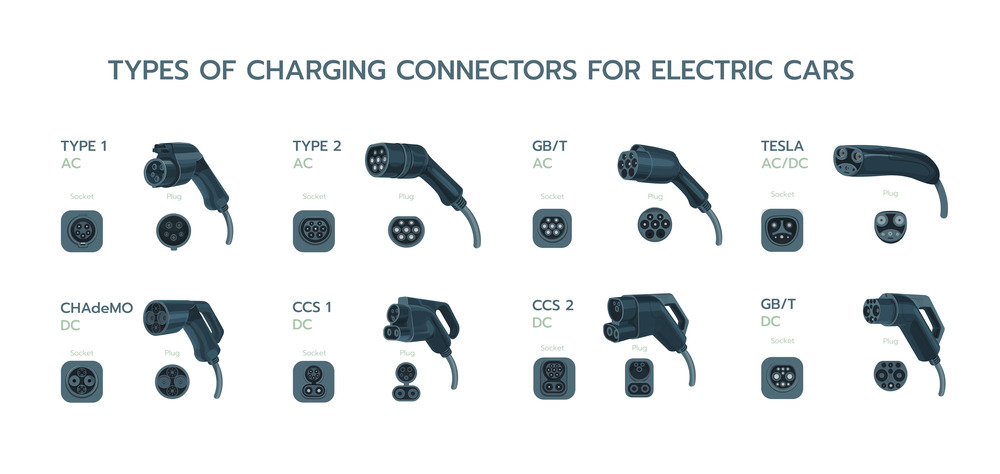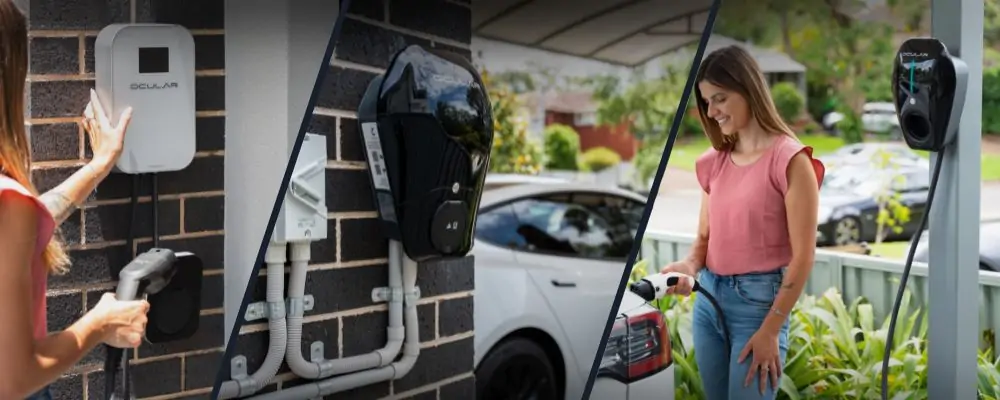Types of EV Chargers for Aussie Homes
Selecting the right charger is one of the most important decisions you'll make as an electric vehicle owner. Your choice on which type of EV charger you choose directly impacts everything from speed and duration, to where you can power up your electric vehicle.
First, you’ll want to know the three main charging levels, the different types of EV chargers, and Australia’s most common plug types before purchasing and installing a home charging station.
Refer to our complete EV Charging guide for an introduction to EV chargers.

Overview of EV Charging Levels
There are three main EV charging levels—Level 1 (AC), Level 2 (AC), and Level 3 (DC Fast Charging).
Level 1 Charging: Standard Home Outlets
Level 1 chargers are the simplest of the three EV charger types. Like any other electrical appliance, they plug into the standard 230V AC single-phase outlets found in residential homes.
This EV charger takes the longest time to completely charge an electric vehicle, spanning anywhere from 12 hours to more than a day depending on things like the vehicle model and plug type. One advantage of level 1 chargers, though, is that they do not require intricate wiring upgrades.
Level 2 Charging: Dedicated Home and Public Chargers
A level 2 home charger can fully charge an EV battery overnight, taking 4-10 hours on average. Most EV owners choose this type of charger when installing home charging points as they offer the best balance of EV charger cost and charging speed.
These are also the most common chargers you’ll see at a public charging station such as a supermarket, public park, workplace, or shopping centre.
One drawback is that level 2 charging requires dedicated wiring and needs to be installed by a licensed technician. The good news is that virtually every newer EV can be charged using a level 2 charger.
DC Fast Charging: Rapid Public Charging Stations
Unlike level 1 and 2 chargers, which use alternating current (AC) electricity, level chargers use direct current (DC) enabled fast charging.
The DC charger is the fastest and can fully charge an EV in as little as an hour with maximum power capacity—a truly impressive feat.
It’s important to note that installing level 3 chargers at home is not practical. They are far too costly and complex to be worth it, requiring permits, a very powerful electrical connection, and tens of thousands of dollars for purchase and installation. For this reason, level 3 chargers are mainly used in commercial and roadside locations.

Common EV Charger Plug Types in Australia
The most common EV charger types in Australia today are Type 2 (Mennekes), CCS2 and CHAdeMO plugs.
Type 2 (Mennekes) Plug
Type 2 plugs operate on AC electricity and can be either single or three phase. They function at a rate of 7.4 kW (single phase) or 22 kW (three phase). Most new EVs will come with a Type 2 plug as standard and they are by far the most common plug type in Australia.
Combined Charging System (CCS2) Plug
CCS2 is a super fast DC charger that uses Type 2 plugs with two additional pins at the bottom. The CCS2 plug looks very similar to the Type 2 Mennekes plug but has up to 350kW of power.
If Type 2 is the dominant AC charging plug, then the Combined Charging System (CCS2) is quickly becoming the standard in Australia for DC fast charging. Many public charging stations will have both Type 2 (for AC charging) and CCS2 (for DC fast charging) connectors.
CHAdeMO Plug
CHAdeMO is a rapid charging connector for EVs that stands for "CHArge de MOve"; and is a pun for “O cha demo ikaga desuka” in Japanese, which means “Let's have a cup of tea while charging”. It is both the name of the DC charging technology and the organisation that develops the technology.
CHAdeMO was developed by the Japanese auto manufacturer Nissan in partnership with Mitsubishi, Toyota, Fuki, and Tokyo Electric Power. They can reach ranges of 400kW, however, they are declining in popularity in Australian vehicles.
While less common, some public charging stations still offer CHAdeMO options alongside CCS2 to accommodate older vehicles.
Benefits of Installing an EV Charger at Home
Having a personal EV charger at home can save you the cost of charging in public spaces, is often more convenient (since your car spends the most time at home, anyway), saves time and is overall, better for the environment.
Save Time and Avoid Public Charging Stations
Installing an EV charger at your home will eliminate the need to use public charging stations. As charging times can take several hours, it will be much more convenient and comfortable to charge your EV at home overnight or during the weekend.
Reduce Long-Term Charging Costs
Installing a home charger can also save you money over the long term. Using public chargers can add up, and there are great eco-friendly home charger options that use green energy and can be connected to your energy tariffs to only charge during off-peak hours when electricity rates are lowest.
Common Myths About EV Charging Debunked
There have been discussions around EV charging that have led some people to believe that EV charging takes too long, or that EV chargers are too expensive to install. However, we’re here to address these misconceptions.
"EV Charging Takes Too Long"
While this can be true in some cases, it couldn’t be further from the truth for others. It mainly depends on the type of charger. Type 3 (DC) chargers can recharge an EV at phone speeds in some cases.
Many factors will affect charging times:
- Battery size
- Load sharing
- The charger’s charging rates
- The EV charge acceptance rate
"EV Chargers Are Too Expensive to Install"
Of course, there is an initial cost to install a home EV charger. But, if you look at this as an investment, you’ll quickly find that this one-time fee quickly pays for itself. It also allows you to charge at home overnight, saving you time, which is more valuable than money.
Be sure to keep an eye out for government rebates and other incentives in Australia which will make installation even more affordable.
Choosing the Right EV Charger for Your Needs
In general, you should choose the type of EV charger based on your EV usage, home-charging infrastructure availability, and which charger type is compatible with your EV.
revcharge is a top EV charger retailer and installer supplying the Australian market. If you need help finding an EV charger or you’re a new electric vehicle owner, feel free to contact us for recommendations, advice, and support.
A member of our team can provide you with a free, no-obligation quote, recommend the best types of EV chargers, and even schedule your EV charger installation at home with one of our technicians.







